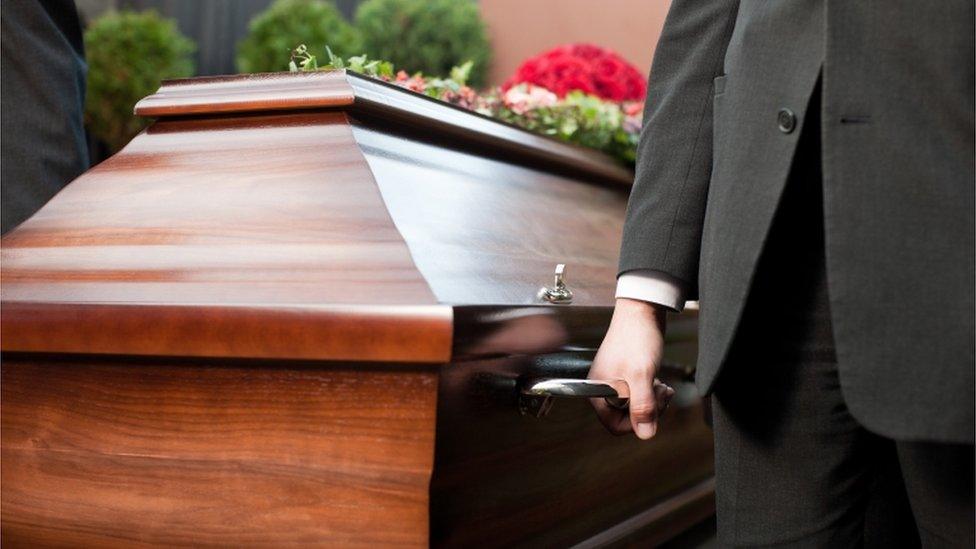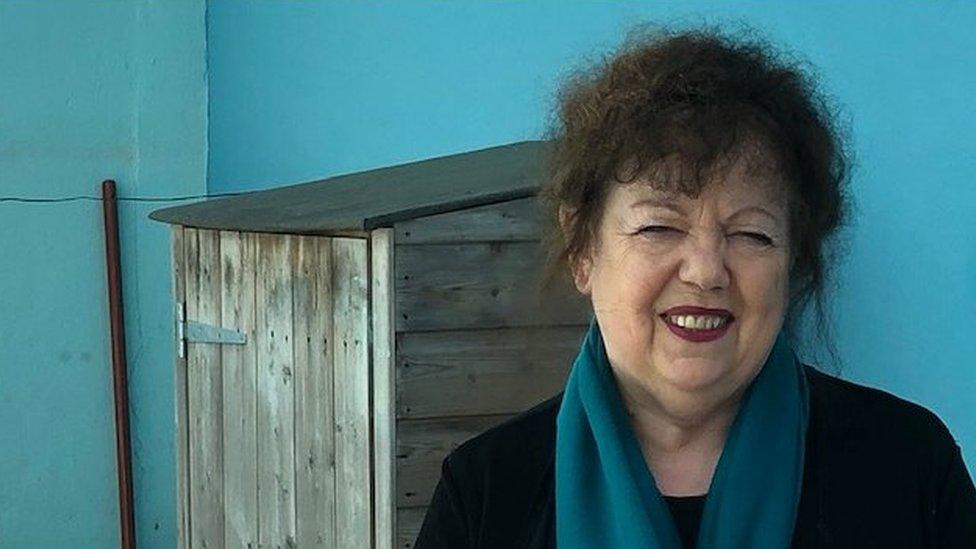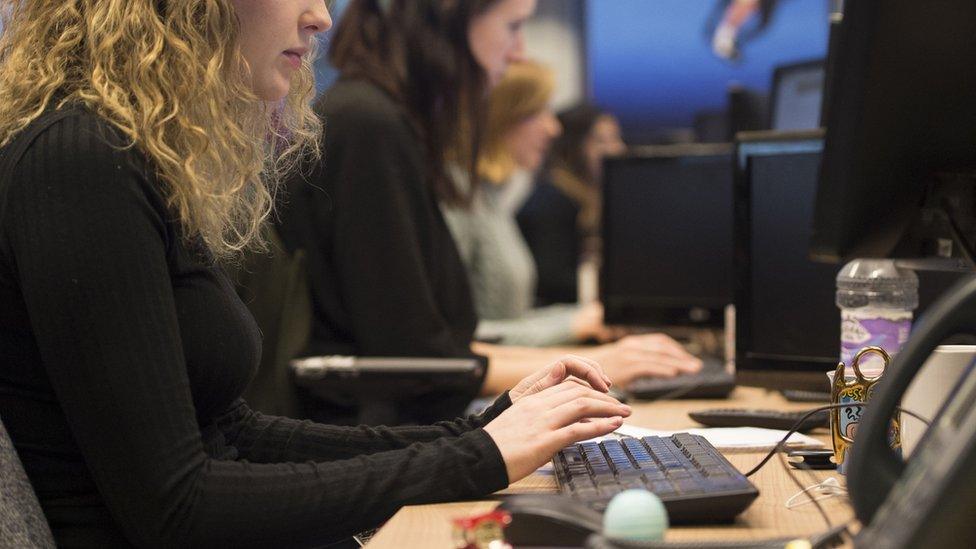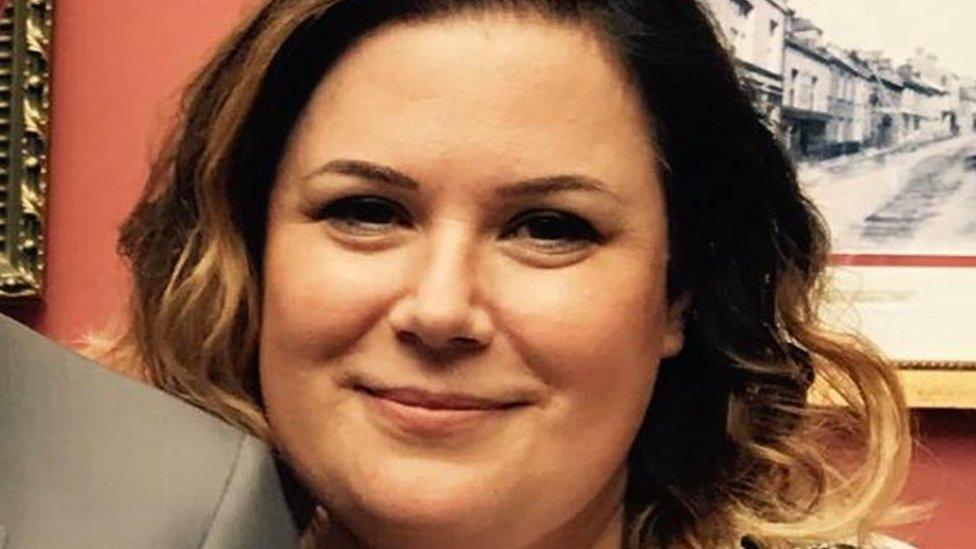Coronavirus: Funeral services 'should be banned'
- Published
- comments

"Non-attendance funerals" would prevent a lot of further anguish, according to a humanist celebrant
There are calls for funeral services to be banned during the coronavirus crisis because of limits on the number of mourners causing distress to families.
Lorraine Barrett, a humanist celebrant of 11 years, is calling for a ban.
The former Welsh assembly member said a prohibition on funeral ceremonies would protect families as well as crematorium and funeral workers.
Welsh Government guidance does not set limits on numbers but insists attendees stay 2m (6ft 6ins) apart.
Mrs Barrett said the arbitrary nature of limits set by individual crematoria and the restrictions imposed by the crisis - preventing mourners from comforting and supporting one another in traditional ways - was exacerbating bereaved families' distress.

People should instead organise memorial services once the outbreak has subsided, Lorraine Barrett says
The current situation had created a "mishmash of different approaches to the funeral process", she explained.
"Some crematoria around the UK have stopped attendances at funerals, so you just have a direct cremation with no-one there," Mrs Barrett said.
She said government guidelines state "immediate family can attend a funeral, up to a certain number", which had led to more questions.
"But who's immediate family? I've dealt with families with 10 siblings, 25 grandchildren, and I've heard of families now who are having to decide which members of their family can go and it's really, really distressing."
She called on both UK and Welsh governments to "look seriously at non-attendance funerals, if only for a few weeks".
Mrs Barrett, who stopped conducting services in early March when concern about the virus began to grow, urged bereaved families to "focus on the future" and organise memorial services once the outbreak has subsided.
Funeral director Dean Thomas, from Caerphilly, echoed these concerns.
"The problem at the moment is that the guidance is changing frequently and different councils are interpreting it differently, so families are having to decide how many people can attend a funeral, who can and can't attend, at a very difficult time for them," said Mr Thomas, owner of Caerphilly Funeral Services.
Mr Thomas called for a "common sense" approach, allowing families the flexibility to decide for themselves who to invite to services.
Rhys Price, of family firm Gwilyn Price Funeral Directors in Lampeter, said the same rules should apply to all funerals.
"It would make things a lot easier for us and the public. Everyone would know where they stand form the start," he said.


A SIMPLE GUIDE: How do I protect myself?
AVOIDING CONTACT: The rules on self-isolation and exercise
LOOK-UP TOOL: Check cases in your area
MAPS AND CHARTS: Visual guide to the outbreak
VIDEO: The 20-second hand wash

Welsh Government guidance to protect workers states mourners can attend funerals "if they are the person who has organised the funeral, if they have been invited to attend or are the carer of the person who is attending a funeral".
The number of people who are allowed to attend depends on the size of the venue because of the two-metre distancing rule.
The Church in Wales has ceased all services, including funerals in churches, although graveside funerals can take place with up to 10 immediate family members and friends under strict social distancing guidelines.
Kathy Riddick, coordinator of Wales Humanists, said celebrants would continue working as long as it was "safe and legal to do so" and were offering deferred memorial ceremonies to families later in the year.
She said: "Done safely a final goodbye to the body remains an essential aspect of grieving for many, whether in crematoria or burial places.
"If the law and proper physical distancing is observed, this opportunity to grieve should be offered.
"Individual celebrants should use their discretion and judgement as well as acting within the law and medical guidance."
- Published7 April 2020

- Published4 April 2020

- Published29 March 2020

- Published18 March 2020
